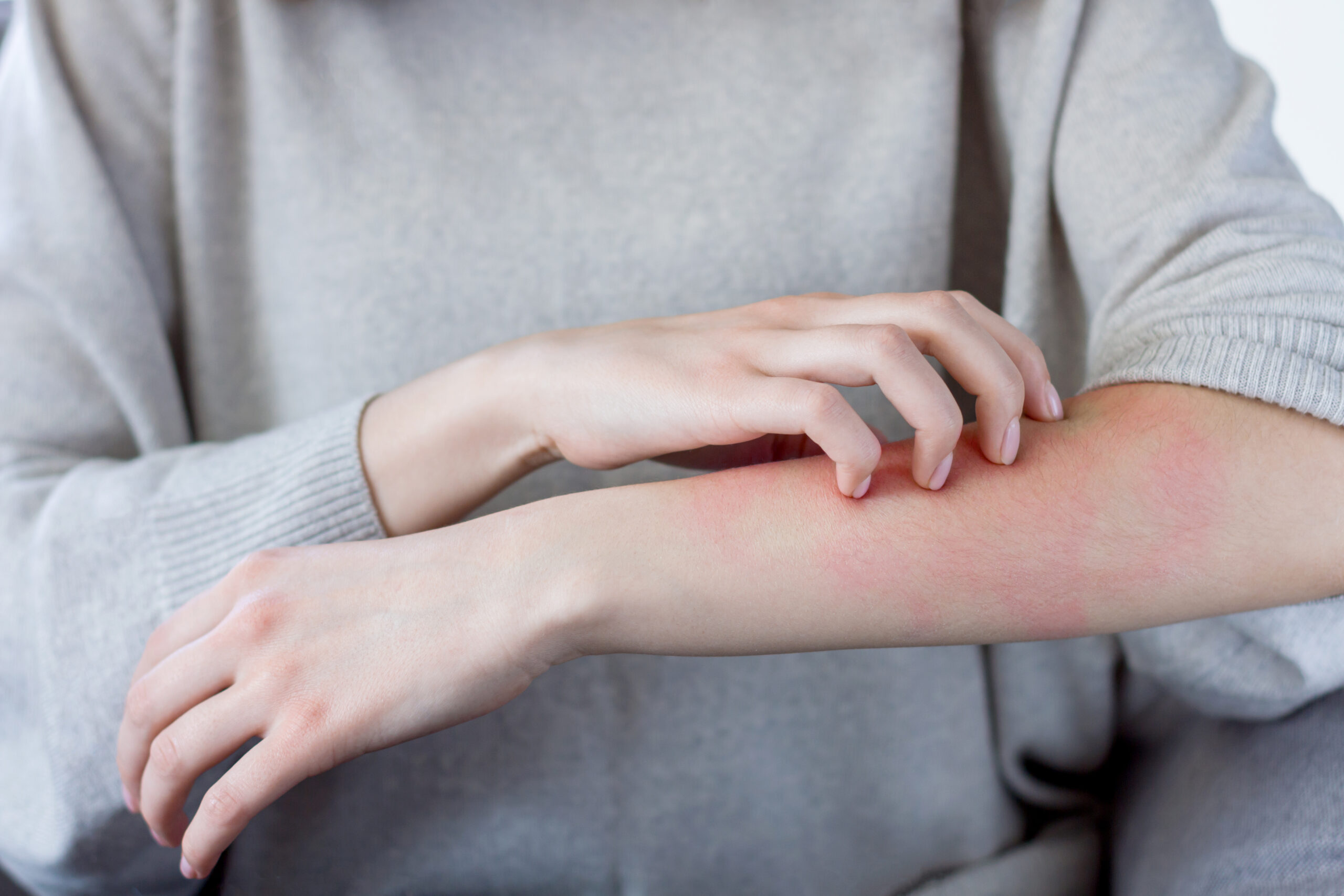
I finally rid myself of my hidden shame and the secret I carried for nearly 20 years. I found a way to move on to a new phase as a recovered victim. But my ugly habit has made a much unwelcome appearance. The brutal habit that I picked up on as a child has returned. I've started scratching again.
As a child, I was constantly bullied. I couldn’t sit at lunch without someone picking on me — making fun of how short I was, how big my nose was, or my love of classical music. Though I now look back thinking how silly it was to have been affected by this, we often forget that as children, words can harm us more than we realize. I felt sad and alone. Though I had a wonderful and supportive family at home, school was miserable, so I started scratching myself. At the time, scratching at my thin, delicate skin to make myself bleed, somehow made sense and in those moments, it made me feel better.
“The reasons someone begins to self-injure can be complex,” says Randi Pochtar, PhD, clinical assistant professor of child & adolescent psychiatry at the Child Study Center at Hassenfeld Children’s Hospital at NYU Langone.
“It is also important to distinguish between self-injurious behaviors and body focused repetitive behaviors, such as skin picking or hair pulling. It is sometimes assumed that hair pulling, and skin picking are the same as self-injurious behaviors. Whereas self-injurious behaviors are often done with the intention to injure oneself to provide relief from emotional distress, those who engage in BFRBs generally do not intend to harm themselves. In fact, people who engage in BFRBs often do so unconsciously, and perceive the behavior as soothing and satisfying.”
I kept up my habit of scratching until my mid-20s, when I finally quit cold turkey. I had begun a new life and was happily living in Italy with my husband. We welcomed a daughter nearly three years ago and it seemed my habit was a thing of the past, though the scars that covered my body from head to toe were a constant reminder.
In Italy, the pandemic was handled very differently than it was in America.
My family and I had been on some sort of lockdown for nearly a year. It felt like I was in prison. It seemed like a nightmare that wouldn’t end. It was like living a horrifying version of Groundhog Day. I tried to keep up my appearance as a calm and loving wife and mother — and that’s all true. I was and still am. But the overall stress and anxiety eventually caught up to me.
I was home all the time. I couldn’t so much as take my daughter to the park, since they were closed. I was nervous taking her anywhere indoors during the height of the pandemic, even the supermarket. My daughter had no other contact, expect with myself, my husband and my mother. It was too much. I couldn’t shake an irrational feeling of guilt that this was the life my toddler was living. I often felt a perfect storm of anger, sadness, and fear.
My scratching snuck up without me so much as noticing — as bad habits often do.
But one evening, I looked down at my leg and saw multiple scars. Not my old scars, which are now just dark spots on my skin, but new, freshly made scars — bumpy, red, and raw. It was in the moment that I experienced my worst fear: I had started scratching again and I didn’t even know it.
How? Why? How had a habit that had taken me so long to break returned?
It’s no surprise that the pandemic caused me to pick up my habit again, as Pochtar explains.
“The pandemic has impacted the likelihood of self-harm behaviors or relapsing self-harm in several different ways. We know that the pandemic challenged people’s ability to use their existing coping mechanisms. Commonly effective coping strategies, such as exercise, and connecting with friends and family, were limited by the nature of social distancing. The fear of illness and uncertainty surrounding the pandemic may have exacerbated the anxiety and distress that can already precipitate these behaviors for some individuals.”
During the height of the pandemic, I was separated from my father and brother in our hometown of NYC and I was in constant fear of contacting the virus.
It made playdates and lunch dates with friends a thing of the past, forcing me to confront my anxiety at home with little help from the outside world. Pochtar confirms that that did little to help the situation.
“Other consequences of the pandemic, such as increased stress on relationships, jobs, food security, education, severe illness or death of loved ones, and child care may have further exacerbated the experience of anxiety, depression, loneliness, and social isolation.”
I’m ashamed. Humiliated. Looking from the outside, one might wonder why I would do this to myself? I’m a happy and fortunate person. I love my life and I have a wonderful, supportive family. My relapse made me feel weak.
I’m embarrassed just admitting on paper that I’ve started scratching again.
I feel like I’ve let myself down and I feel like I’ve let down my family. But it’s my family that is going to help me fight this, yet again.
“Once ready to change this behavior, individuals can address their self-harm by repeatedly engaging in alternative behaviors when the urge to self-harm arises,” says Pochtar. “The first step in this process involves increasing awareness to what leads to the self-harm behavior, including certain patterns of thinking and feeling, as well as understanding what one experiences after engaging in this behavior.” For me, I have always scratched when I feel completely overwhelmed and anxious.
The fact that I’m at least aware of why I scratch is essential.
“For those whose self-harm behaviors serve a function of emotion regulation, identifying and repeatedly practicing alternative strategies that can help modulate distress without causing bodily harm can be effective. These strategies can include things like holding ice, distraction, self-soothe strategies, and certain breathing techniques. When practiced repeatedly, with each urge to self-harm, these strategies can break the connection between the urge and the behavior and allow for new learning to occur.”
When some of these strategies don’t seem like they will be enough to help, Pochtar recommends dialectical behavior therapy.
“DBT is a treatment developed by Marsha Linehan, PhD, at the University of Washington that treats suicidal and self-harming behaviors. DBT has since been adapted for many different uses, including for use with children and adolescents. DBT helps individuals understand the function or functions of their self-harm behavior and learn a new set of skills. In addition, having compassion for oneself that this process is hard work and takes time, as well as practice and repetition, are also incredibly important.”
I know it won’t be easy to stop scratching again.
It took so much hard work and concentration the first time, that I’m nervous doing this again. But this time is different. I have more tools to help me and I’m more aware than I used to be of my habit. The biggest difference breaking my habit this time? My 3-year-old daughter.
She is going to help me stop once and for all. She will be my distraction. She will be the one to help me keep my hands busy, like by doing a puzzle [or] coloring. My daughter will give me the strength that I didn’t have back then. She will give me something more to fight for. I want to be the strongest role model I can be for her and the only way I can accomplish that is by having the power to break this habit.
Every time my daughter sees me scratch myself, she lets out a loud cry and moves my hand from my skin.
At 3 years old, she can recognize that this is something I shouldn’t be doing, so why can’t I? Why haven’t I been able to figure it out at 32 years old? I have no doubt that this will be a challenge, but it’s a challenge I’m up for, now more than I ever. If the pandemic taught me anything, it’s that brutal and unexpected things can leave a mark at any moment.
Why would I want to leave a mark of my own doing?




